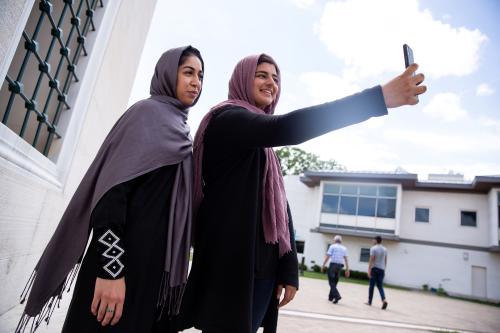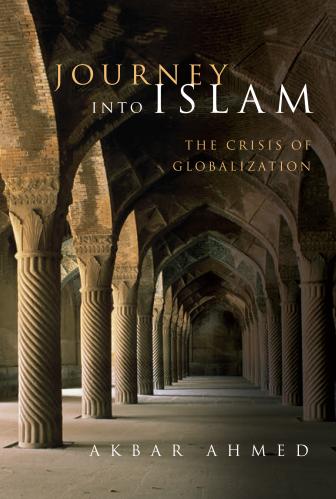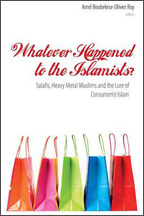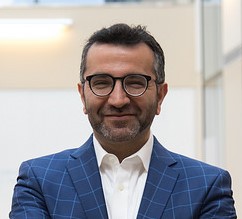Content from the Brookings Doha Center is now archived. In September 2021, after 14 years of impactful partnership, Brookings and the Brookings Doha Center announced that they were ending their affiliation. The Brookings Doha Center is now the Middle East Council on Global Affairs, a separate public policy institution based in Qatar.
Today is the first day of Eid Al-Fitr—a three-day celebration that follows the month of Ramadan during which Muslims fast during the day. Recently several factors made American Muslims nervous and fearful. Eid is a good time for the society to make Muslims feel at home in America.
In Western Washington, Eid started with a communal prayer in 35 mosques as well as in rented secular spaces such as Seattle’s Washington State Convention Center. A typical Muslim congregation reflects the American mosaic: a recent refugee from Syria may pray next to a black who traces her roots into slavery; a Turk prays next to a Latino; a Somali immigrant next to one from Bosnia.
Racially diverse, proud for completing their fasting marathon and dressed in their traditional clothes, a Muslim congregation will resemble the Olympics’ closing parade.
Eid is a bittersweet time. We celebrate the passing of a physically demanding time; yet we also miss Ramadan because it is not just about fasting but is also a time to prioritize the spiritual, familial and social.
For American Muslims, this Eid is bittersweet in another sense as well. A 2011 Gallup study showed that about six out of 10 Muslim Americans believe that they are thriving in America and that their standard of living has increased in the last two years, even amidst our poor economy. Yet at the same time, while Muslims are following the same process of integration that other groups throughout U.S. history have followed, anti-Muslim sentiments have worryingly increased.
Three recent developments have heightened American-Muslims’ anxiety. First is the escalating attacks on mosques – seven in the last two weeks alone. In Morton Grove, Ill., and Hayward, Calif., someone shot a pellet rifle at Muslim houses of worship. In Lombard, Ill., another threw a homemade bomb, and pig legs were thrown at a mosque in Ontario, Calif.
Mosques in places such as North Smithfield, R.I., and Oklahoma City have been vandalized. The worst incident was the burning of a mosque to the ground in Joplin, Mo.
According to the Council on American Islamic Relations, in 2010 there were 13 acts of violence and 31 acts of vandalism against mosques. If the number of attacks of the last two weeks is any indication, this year will set a record.
A second reason for our anxiety is elections and the rhetoric that often goes with them. Some politicians rely on polarizing rhetoric to gain support. We are painfully aware that the temptation to pander to small but vociferous anti-Muslim groups has been significant in the past.
Because of their real or (mis)perceived religious identity, both Barack Obama and Mitt Romney may want to avoid the topic of religion. Neither, however, will be likely to speak out on the mistreatment of Muslims. What is worse, Obama’s alleged “Muslimness” will likely be used as part of attack ads financed by some super PACs, making Muslims collateral damage of the anti-Obama campaign.
As a member of a once persecuted minority, Romney may empathize with Muslims and show courage and speak out about their mistreatment. More likely, though, he’ll avoid any topic that could draw attention to his religion.
A third reason for our rising anxiety is the horrific murder of six Sikhs in a Wisconsin temple by a white supremacist. This attack could be considered an anti-Muslim attack as much as anti-Sikh because many anti-Sikh actions are based on a mistaken belief that Sikhs are Muslims. For example, when a Sikh gas station owner was murdered in Arizona four days after 9/11, the attacker thought he was a Muslim.
A cursory glance at America’s history reminds us that Muslims are not the first religious group to face attacks for its religion. Baptists, Catholics, Jews and Mormons have all at times faced severe discrimination, before finding their places in America’s religious landscape. Time after time America’s commitment to religious tolerance and liberty has been tested and proved.
Reversing an anti-Muslim trend will not happen by itself. It depends on Good Samaritans to defend America’s religious freedom against fear-mongering. Small gestures can go a long way, such as wishing Muslims you see a “Happy Eid!” (It’s pronounced eed.)
During Eid, American Muslims have a lot to celebrate. We hope that in the future there is even more to celebrate.









Commentary
Op-edAmerican Muslims are Celebrating, But They’re Nervous as Well
August 19, 2012